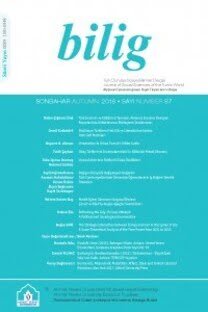The Return of Russia-Africa Relations
Rusya-Afrika İlişkilerinin Geri Dönüşü
___
Books and ArticlesBakucharsky, E. M. (2007). "Cooperation between Russia and Algeria". Russia-Africa Relations and Russia's Image in Africa. Moscow: RAN African Institute.
Deich, T., et al. (2003). "African policy of major world powers: USA. Great Britain. France. China". Africa in Russia's Foreign Policy Priorities. Moscow: RAN In- stitute for African Studies.
Deich, T. L. (2007). "New partners of African countries: effects on the image con- struction domain on the continent". Russia-Africa Relations and Russia's Im- age in Africa. Moscow: RAN Institute for African Studies.
-(2001). "Russia and China in Africa on the eve of the 21st century". Africa and Russia-Africa Relations in the Contemporary World. Moscow: RAN Insti- tute for African Studies.
Deich, T. L. and D.V. Polikanov (2003a). "Russian-African political relations: con- temporary state and prospects". Africa in Russia's Foreign Policy Priorities. Moscow: Institute for African Studies.
-(2003b). "Cultural and scientific ties as a component of Russian-African co- operation". Africa in Russia's Foreign Policy Priorities. Moscow: RAN Institute for African Studies.
Deich, T. L. (2007). "Politics as a Factor in Russia's Image in Africa". Russia-Africa Relations and Russia's Image in Africa. Collection of Articles. Moscow: RAN Institute for African Studies.
Emelyanov, A. L. (2000). "Russia-Africa Relations". Foreign Policy of the Russian Federation. Moscow.
Gavrilov, Y. N. (2004). "Russia and Africa". S.A. Proskurina (ed). International Rela- tions and Russia's Foreign Policy Activities. Moscow: Institute of Social Psy- chology.
Ivanov, I. S. (2002). New Russian Diplomacy: Ten Years in the Country's Foreign Policy . Moscow: OLMA-PRESS.
-(2004). Russia in the Contemporary World. Responses to the Challenges of the 21st Century: Articles and Discussions. Moscow: OLMA-PRESS.
Korendiasov, E. N. (2003). "Russia in the framework of "G-8" partnership with Af- rica". Africa in Russia's Foreign Policy Priorities. Moscow: RAN Institute for African Studies.
Lopatov, V. V. (2003). "The place of African Countries in Russian foreign trade". Africa in Russia's Foreign Policy Priorities. Moscow: RAN Institute for African Studies.
-(2007). Russia's Trade-Economic Relations with Africa at the Late 20th Cen- tury and the Early 21st Century. Moscow: RAN Institute for African Studies.
Maslov, A. A. (2006). "Russia's Africa Policy". Af-Ro 4 (17).
-(2005). "Russia's national economic interests in Sub-Saharan Africa". Af-Ro 5 (12).
Rubinstein, G. I. (1997). "Trade-economic connections and integration problems". Africa's Tragedy: Lessons from the Past. Current Problems. Silhouette of the Future. Moscow: RAN.
Simonyan, N. A. and R.M. Avakov (eds) (1996). Russia and the South: Possibilities and Limitations of Cooperation. Moscow: IMEMO RAN.
Solodovnikov, V. G. (ed) (2000). Russia and Africa: A Look to the Future. Moscow: RAN Institute for African Studies.
Newspapers and News
"The time to return to the real business" (2007). Diplomat 6 _____http://diplomatrus.com/article.php?id=979> (8 January 2009)
Shedrin, Vladimir. (2006). "Open doors of the Land Continent". Rossiyskaya Gazeta. 08 September.
- ISSN: 1301-0549
- Yayın Aralığı: 4
- Başlangıç: 1996
- Yayıncı: Ahmet Yesevi Üniversitesi Mütevelli Heyet Başkanlığı
Türk hikayeciliğinin protopi sayılabilecek Heft-Han'da mekan
The Return of Russia-Africa Relations
Türk Hikâyeciliğinin Prototipi Sayılabilecek Heft-Hân'da Mekân
Ulusal/Etnik Kimliklerin Stratejik İnşası: Kuzey Kıbrıs Örneği
Serap AKFIRAT ARSLAN, Bengi ÖZKAN ÖNER
Giresun'da Yaşatılan Sacayağından Geçme Geleneğinde 'Sacayağı' ve 'Üç' Ne Anlatıyor?
Siyasi Coğrafya Açısından Sınırlar ve Tarihi Süreç İçinde Türkiye'de Sınır Kavramı
